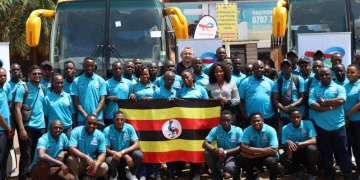
RWAMWANJA REFUGEE SETTLEMENT, Uganda — Every Saturday morning, Mahoro Florence and dozens of fellow women farmers gather in the rolling hills of this refugee settlement, singing as they work the land. For these women, many of whom are single mothers, the settlement has become a sanctuary where survival has blossomed into hope.
Mahoro, a 38-year-old Congolese mother of eight, fled her village in eastern Democratic Republic of Congo in 2018 after armed men kidnapped her husband and threatened to take her children. She found safety in Uganda, which has become a model of inclusivity for its welcoming policy toward refugees.
Today, Uganda hosts over 1.7 million refugees and asylum-seekers, more than any other country in Africa and third in the world. The Uganda’s refugee policy allows refugees to access national services, including education and healthcare, and provides them with plots of land for housing and small-scale cultivation.
However, the continuous influx of new arrivals is putting significant pressure on the country. In the past three years, an average of 10,000 people a month have found safety in Uganda, leading to overcrowding at schools and health facilities serving both refugees and host communities.
The UN Refugee Agency is working with the Ugandan government to bolster support for refugees, increasing access to livelihoods for both displaced people and host communities.
Uganda’s generosity has not gone unnoticed. UN High Commissioner for Refugees Filippo Grandi recently praised the country’s policies, saying they have opened up important avenues for self-reliance.
“Granting refugees access to land, schooling, healthcare, vocational training, and jobs boosts the local economy for everyone, including Ugandans,” Grandi said. “This model enables refugees to meaningfully contribute to society, and it should be an inspiration for others.”
But Grandi warned that Uganda’s generosity should not be taken for granted. He called on donors, development partners, and the private sector to support the Ugandan government.
For Mahoro and her fellow women farmers, Uganda’s refugee policy has been a lifeline. After a day’s work, they gather for their weekly table banking meeting, where they contribute to a shared kitty and support one another.
“We also keep some money aside to buy pesticides for the farm,” Mahoro said. “When we are together, we forget the difficulties we face in our homes. We heal from the trauma we suffered.”
Mahoro’s dreams now extend beyond survival. She wants her children to get quality education and decent jobs.
“I have suffered a lot, but I don’t want my children to go through the same suffering,” Mahoro said. “I want them to have a bright future.”










Discussion about this post